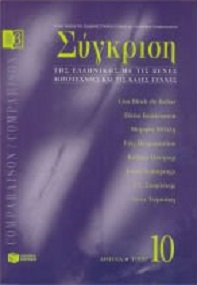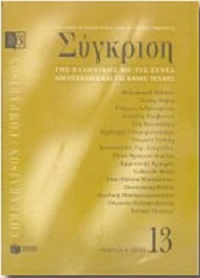Η μετάφραση της Αντιγόνης του Σοφοκλή από τον Friedrich Hölderlin και η διασκευή της Αντιγόνης από τον Bertolt Brecht: Μια φιλολογική ανίχνευση
Περίληψη
Λεπτομέρειες άρθρου
- Πώς να δημιουργήσετε Αναφορές
-
Πούχνερ Β. (2017). Η μετάφραση της Αντιγόνης του Σοφοκλή από τον Friedrich Hölderlin και η διασκευή της Αντιγόνης από τον Bertolt Brecht: Μια φιλολογική ανίχνευση. Σύγκριση/Comparaison/Comparison, 10, 59–81. https://doi.org/10.12681/comparison.11461
- Τεύχος
- Τόμ. 10 (1999)
- Ενότητα
- Άρθρα

Αυτή η εργασία είναι αδειοδοτημένη υπό το CC Αναφορά Δημιουργού – Μη Εμπορική Χρήση – Παρόμοια Διανομή 4.0.
Οι συγγραφείς των άρθρων που δημοσιεύονται στο περιοδικό Σύγκριση διατηρούν τα δικαιώματα πνευματικής ιδιοκτησίας επί των άρθρων τους, δίνοντας στο περιοδικό το δικαίωμα της πρώτης δημοσίευσης. Άρθρα που δημοσιεύονται στο περιοδικό Σύγκριση διατίθενται με άδεια Creative Commons 4.0 και σύμφωνα με την άδεια μπορούν να χρησιμοποιούνται ελεύθερα, με αναφορά στο/στη συγγραφέα και στην πρώτη δημοσίευση για μη κερδοσκοπικούς σκοπούς και με δικαίωμα τροποποίησης μόνον με παρόμοια διανομή (αν αναμείξετε, τροποποιήσετε, ή δημιουργήσετε πάνω στο υλικό, πρέπει να διανείμετε τις δικές σας συνεισφορές υπό την ίδια άδεια όπως και το πρωτότυπο).




